Box and Sprout: is this the future of shopping for houseplants?
Box and Sprout: houseplants delivered to your door
For Tooting-based plant business Box and Sprout, the customer journey doesn’t end with the purchase of a plant. In fact it’s just beginning. Founders Charlie Chappatte and Rob Ford are on a mission to help urban residents reconnect with nature. With city escapes few and far between – especially in our current times, bouncing between lockdowns and strict tier systems – the pair are growing an online community of indoor gardeners, using video tutorials and workshops to teach them how to successfully nurture vegetables, herbs and houseplants.
Customers have two options: you can either purchase individual plants by scrolling through pictures of healthy-looking specimens that have had their botanical names swapped for affectionate, less intimidating nicknames on the website – such as the Michaela (officially Spathiphyllum) or the Dark Green Nervy (Fittonia). Alternatively, you can join the Sprout Box Club, a subscription service that delivers a new 'plant project' to your door every month, which you can grow alongside a virtual community of gardeners, and with the help of online workshops and webinars.
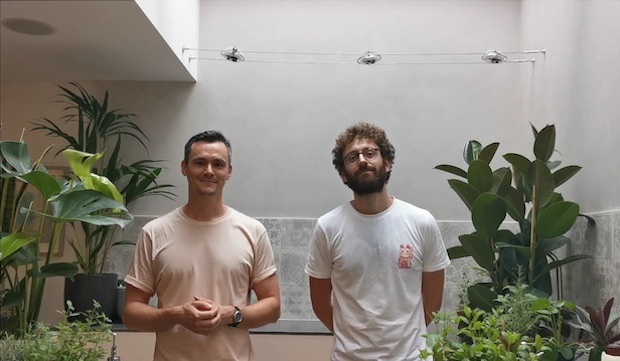
Rob Ford (left) and Charlie Chappatte (right) are the founders of Box and Sprout
Charlie and Rob are environmentally driven too, investing £1 from each order into regreening city projects and educating their customers about local rewilding initiatives to get involved with or support from home.
Could the Box and Sprout model be the future of how we shop, grow and care for plants and vegetables? We spoke to the founders to find out more…
Holly O’Mahony, Culture Whisper: 'Box and Sprout is not your average plant business. For starters, you’re operating solely online, but you’re also running a subscription service that includes video tutorials guiding your customers through how to care for their plants. How did the idea for your business come about?'
Box and Sprout: 'The business is a baby of lockdown. The idea came about in March 2020, just as the government was putting the first lockdown measures in place. We first started selling potted vegetable plants to Londoners. We were selling small baby plants that had just been potted into large terracotta pots. We were conscious that an awareness and interest in eco-friendly living was rising quickly, and younger people were looking to grow things – houseplants, vegetables, herbs – for the first time.'
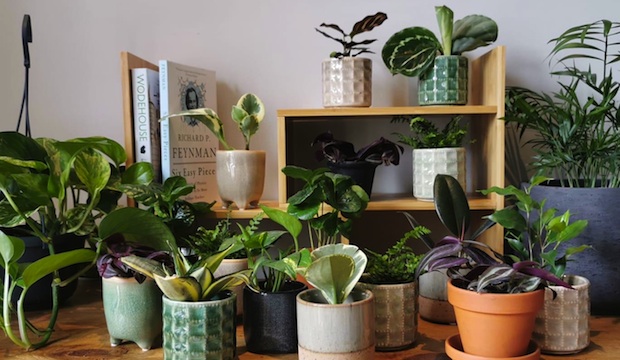
CW: 'How has the business evolved into the chic-but-friendly service you’re operating today?'
BAS: 'The huge shift in how we have had to live our lives this past year has given us all time to try new things, and growing plants has definitely been one of them! Lots of people are really enjoying the opportunity to grow a little bit of their own food on their windowsill, or in whatever space they have. There is a really nice learning element too, and most of our customers are people growing food for the first time.
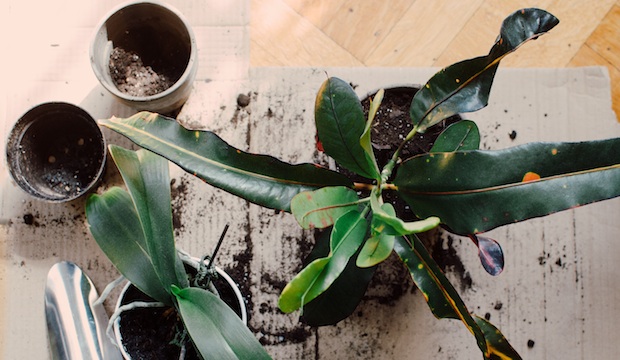
'Towards the end of summer, we started looking at what else the business could offer and expanded our range to offer houseplants as well. At the same time we also set up our subscription service, which gives people a monthly "plant project" where they can get their hands dirty and learn to grow something new – all in sizes and packages suitable for city homes.'
CW: 'The digital-first model is great for lockdown as it gives people access to plants and learning resources without them having to leave the house. But will you be looking to open a physical shop when things get up and running again?'
BAS: 'We have toyed with the idea of opening up a physical space, one with plants and workshops, and may come back to it in the future. For now, we're staying purely digital. It means we can reach lots of customers while keeping our overheads low, which is important since we're still not out of the pandemic yet.'
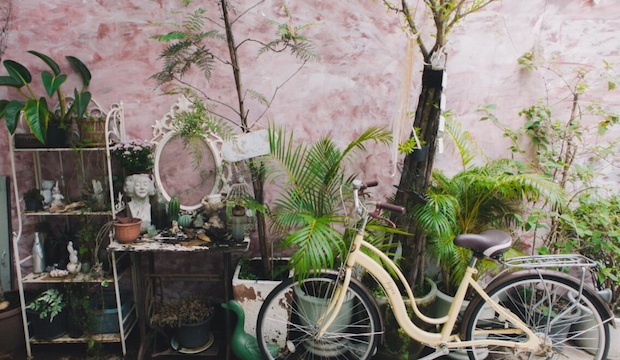
CW: 'The trend for filling our homes with houseplants pre-dates the pandemic by some years. But why has an interest in indoor greenery been on the rise over the last decade?'
BAS: 'We are much better informed, more eco-conscious and more environmentally aware. In cities it can be difficult to feel that connection with nature since there is so much grey but, with houseplants, we can bring that positive connection to nature to us. It's worth noting however that houseplants were enormously popular in Victorian England as well, so this isn't a new thing.'
CW: 'For those of us who struggle to keep our plants alive, the video tutorials and step-by-step guides are a very appealing part of the Box and Sprout offering…'
BAS: 'It's totally normal to kill a plant! There's a saying that you don't really know how to look after a plant until you've killed it three times. But actually, you can get the basics very quickly and from there on you can learn as you go. A lot of people want to learn about their plants in order to forge a deeper connection with them, which in turn enhances the wellbeing benefits. Our advice would be to start with at least one low-maintenance, hardy plant [such as a peace lily, snake plant or spider plant] so that when you inevitably kill some of your plants, you’re not completely put off!'
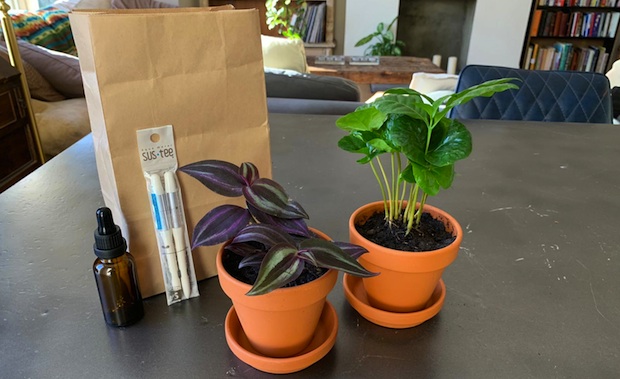
CW: 'Growing a community of plant lovers is also part of what Box and Sprout is about. Tell us more about this.'
BAS: 'Building a community means we can get to know our customers, not just by demographics or metrics, but actually know them by name – which is very rewarding. We can share in the little wins when they get to eat something they grew on their windowsill for the first time, or when we help them nurse their houseplant back to health. It's early days but members of our community are already connecting with each other and sharing tips and tricks; it's a great way to learn and stay motivated if something doesn't go to plan the first time you try.'
CW: 'You’ve also committed to achieving some green initiatives for 2021, including investing £1 of each order into re-greening projects. Why is this important to you?'
BAS: 'Well, we both live in London, and most of our customers live in cities too. Living in cities typically means lots of traffic, noise, concrete, pollution and not much green space or wildlife. There is an alternative view of what city life can look like though: one in which urban spaces teem with all kinds of life, with micro-parks and hedgerows or green corridors connecting them all. There could also be balcony ponds and wildflowers growing in place of closely mown grass in parks.
'Cities could soon be much greener, healthier and happier places to be and live, and there are lots of excellent organisations and projects building momentum in this space. We're not quite ready to drive our own projects yet – however, we can definitely support existing initiatives and share their stories with our community.'
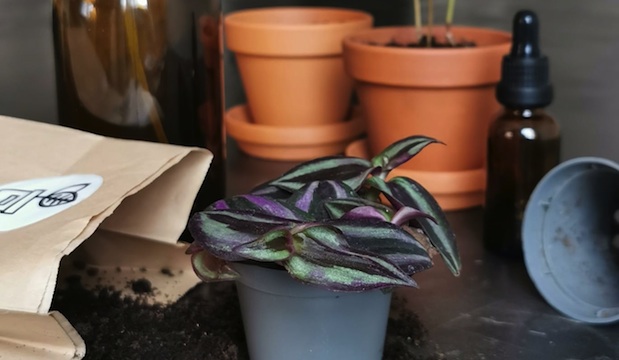
CW: 'FInally, what are the biggest plant trends for 2021? Can you predict which species are likely to be particularly popular this year?'
BAS: 'This is always very unpredictable, but we suspect there are still lots of new plant parents out there owning plants for the first time this year. There is also so much useful content online that they can make informed decisions when they're starting out – and so we think we'll see an increase in popularity for good beginner plants, which are reasonably low-maintenance and quite hard to kill. We recommend starting off with the likes of snake plants, cast iron plants, peace lilies, English ivy, Chinese money plants or spider plants – none of which should give you too many problems.'
For more information about Box and Sprout, to place an order to join the subscription service, click here.
Customers have two options: you can either purchase individual plants by scrolling through pictures of healthy-looking specimens that have had their botanical names swapped for affectionate, less intimidating nicknames on the website – such as the Michaela (officially Spathiphyllum) or the Dark Green Nervy (Fittonia). Alternatively, you can join the Sprout Box Club, a subscription service that delivers a new 'plant project' to your door every month, which you can grow alongside a virtual community of gardeners, and with the help of online workshops and webinars.

Rob Ford (left) and Charlie Chappatte (right) are the founders of Box and Sprout
Charlie and Rob are environmentally driven too, investing £1 from each order into regreening city projects and educating their customers about local rewilding initiatives to get involved with or support from home.
Could the Box and Sprout model be the future of how we shop, grow and care for plants and vegetables? We spoke to the founders to find out more…
Holly O’Mahony, Culture Whisper: 'Box and Sprout is not your average plant business. For starters, you’re operating solely online, but you’re also running a subscription service that includes video tutorials guiding your customers through how to care for their plants. How did the idea for your business come about?'
Box and Sprout: 'The business is a baby of lockdown. The idea came about in March 2020, just as the government was putting the first lockdown measures in place. We first started selling potted vegetable plants to Londoners. We were selling small baby plants that had just been potted into large terracotta pots. We were conscious that an awareness and interest in eco-friendly living was rising quickly, and younger people were looking to grow things – houseplants, vegetables, herbs – for the first time.'

CW: 'How has the business evolved into the chic-but-friendly service you’re operating today?'
BAS: 'The huge shift in how we have had to live our lives this past year has given us all time to try new things, and growing plants has definitely been one of them! Lots of people are really enjoying the opportunity to grow a little bit of their own food on their windowsill, or in whatever space they have. There is a really nice learning element too, and most of our customers are people growing food for the first time.

'Towards the end of summer, we started looking at what else the business could offer and expanded our range to offer houseplants as well. At the same time we also set up our subscription service, which gives people a monthly "plant project" where they can get their hands dirty and learn to grow something new – all in sizes and packages suitable for city homes.'
CW: 'The digital-first model is great for lockdown as it gives people access to plants and learning resources without them having to leave the house. But will you be looking to open a physical shop when things get up and running again?'
BAS: 'We have toyed with the idea of opening up a physical space, one with plants and workshops, and may come back to it in the future. For now, we're staying purely digital. It means we can reach lots of customers while keeping our overheads low, which is important since we're still not out of the pandemic yet.'

CW: 'The trend for filling our homes with houseplants pre-dates the pandemic by some years. But why has an interest in indoor greenery been on the rise over the last decade?'
BAS: 'We are much better informed, more eco-conscious and more environmentally aware. In cities it can be difficult to feel that connection with nature since there is so much grey but, with houseplants, we can bring that positive connection to nature to us. It's worth noting however that houseplants were enormously popular in Victorian England as well, so this isn't a new thing.'
CW: 'For those of us who struggle to keep our plants alive, the video tutorials and step-by-step guides are a very appealing part of the Box and Sprout offering…'
BAS: 'It's totally normal to kill a plant! There's a saying that you don't really know how to look after a plant until you've killed it three times. But actually, you can get the basics very quickly and from there on you can learn as you go. A lot of people want to learn about their plants in order to forge a deeper connection with them, which in turn enhances the wellbeing benefits. Our advice would be to start with at least one low-maintenance, hardy plant [such as a peace lily, snake plant or spider plant] so that when you inevitably kill some of your plants, you’re not completely put off!'

CW: 'Growing a community of plant lovers is also part of what Box and Sprout is about. Tell us more about this.'
BAS: 'Building a community means we can get to know our customers, not just by demographics or metrics, but actually know them by name – which is very rewarding. We can share in the little wins when they get to eat something they grew on their windowsill for the first time, or when we help them nurse their houseplant back to health. It's early days but members of our community are already connecting with each other and sharing tips and tricks; it's a great way to learn and stay motivated if something doesn't go to plan the first time you try.'
CW: 'You’ve also committed to achieving some green initiatives for 2021, including investing £1 of each order into re-greening projects. Why is this important to you?'
BAS: 'Well, we both live in London, and most of our customers live in cities too. Living in cities typically means lots of traffic, noise, concrete, pollution and not much green space or wildlife. There is an alternative view of what city life can look like though: one in which urban spaces teem with all kinds of life, with micro-parks and hedgerows or green corridors connecting them all. There could also be balcony ponds and wildflowers growing in place of closely mown grass in parks.
'Cities could soon be much greener, healthier and happier places to be and live, and there are lots of excellent organisations and projects building momentum in this space. We're not quite ready to drive our own projects yet – however, we can definitely support existing initiatives and share their stories with our community.'

CW: 'FInally, what are the biggest plant trends for 2021? Can you predict which species are likely to be particularly popular this year?'
BAS: 'This is always very unpredictable, but we suspect there are still lots of new plant parents out there owning plants for the first time this year. There is also so much useful content online that they can make informed decisions when they're starting out – and so we think we'll see an increase in popularity for good beginner plants, which are reasonably low-maintenance and quite hard to kill. We recommend starting off with the likes of snake plants, cast iron plants, peace lilies, English ivy, Chinese money plants or spider plants – none of which should give you too many problems.'
For more information about Box and Sprout, to place an order to join the subscription service, click here.
TRY CULTURE WHISPER
Receive free tickets & insider tips to unlock the best of London — direct to your inbox